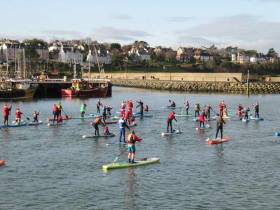Displaying items by tag: Stand Up Paddleboarding
'Spooky SUP' Halloween Social Paddle in Bangor Harbour
SUPhub NI is well known for its Santa SUP but this year the Halloween Social paddle in Bangor Harbour on Belfast Lough exceeded expectations as it was slotted in at short notice, taking advantage of a weather window on the evening of Sunday 30th when 28 paddlers braved the cold.
Iain McCarthy, who runs Suphub said “We were delighted with the turnout for such a last-minute event. Huge thanks to everyone who took part; even with such short notice, this was a cracking turnout with some particularly impressive costumes”. He continued – “Thanks also to the Lightfoot Zero Waste Market for the pumpkin soup and hot chocolate”.
 The Halloween Social paddle in Bangor Harbour on Belfast Lough had costume awards for all ages
The Halloween Social paddle in Bangor Harbour on Belfast Lough had costume awards for all ages
A double win in the race and costume awards went to Jilly Sykes, and Theo Hamilton won the Junior race.
£220 was raised for Bangor Lifeboat. Iain McCarthy added; “ Given that the lifeboat volunteer crew had just finished a 20-hour rotation SAR operation in Belfast Lough with multiple agencies, we were delighted to raise some money and show support for our local lifeboats”.
The next big dressing-up opportunity will be the 2022 Santa SUP on 3rd December, when it’s hoped that last year’s turnout of 96 will be beaten.
 £220 was raised for Bangor Lifeboat at The Halloween Social paddle in Bangor Harbour on Belfast Lough
£220 was raised for Bangor Lifeboat at The Halloween Social paddle in Bangor Harbour on Belfast Lough
Stand Up Paddleboarding Fundraiser at Bangor Harbour
It’s not often a Notice to Mariners is issued by Bangor Harbour on Belfast Lough for a paddleboarding event but this was the case when a fundraiser was held in the Harbour on a very cold Sunday morning (1st Dec) writes Betty Armstrong
Stand Up Paddleboarding has taken off in Northern Ireland and a great turn out of SUPpers took part to support SUPforCancer. There were 38 adults, 12 children and three dogs. A substantial crowd watched from the Eisenhower Pier. It was organised by SUP Hub NI.
The event was sponsored by nine local business and plenty of prizes were won in what is believed to be the first-ever SUP Tombola where numbered tennis balls were scattered around the Harbour and paddlers had to race to scoop one up before a fellow paddler did. Their number correlated to a prize donated by one of the supporting businesses, a new and fun way for people to win prizes. There were special prizes for the Fastest Santa, Fastest ‘grim’ (kid), and best dressed.
In all £723 has been raised so far but the JustGiving link remains open in case readers wish to add to it here






























































